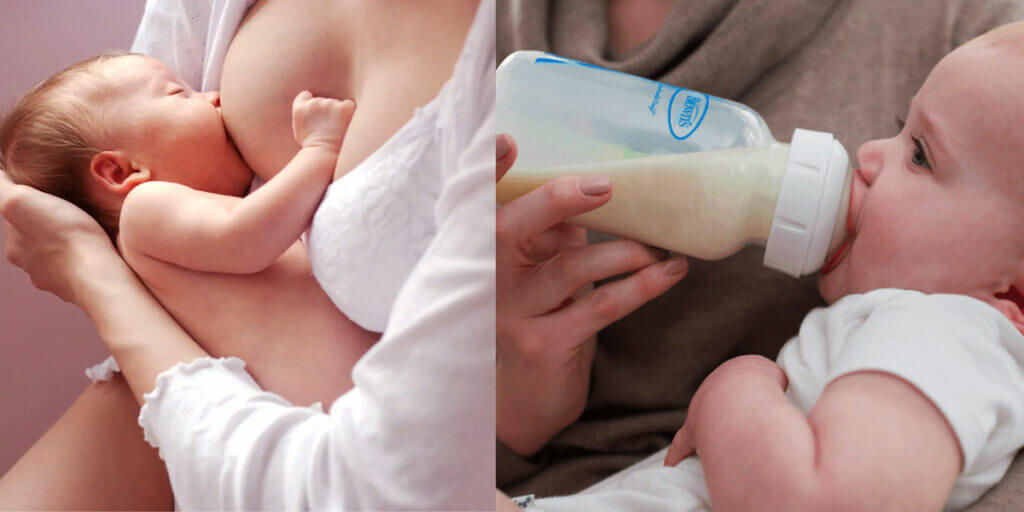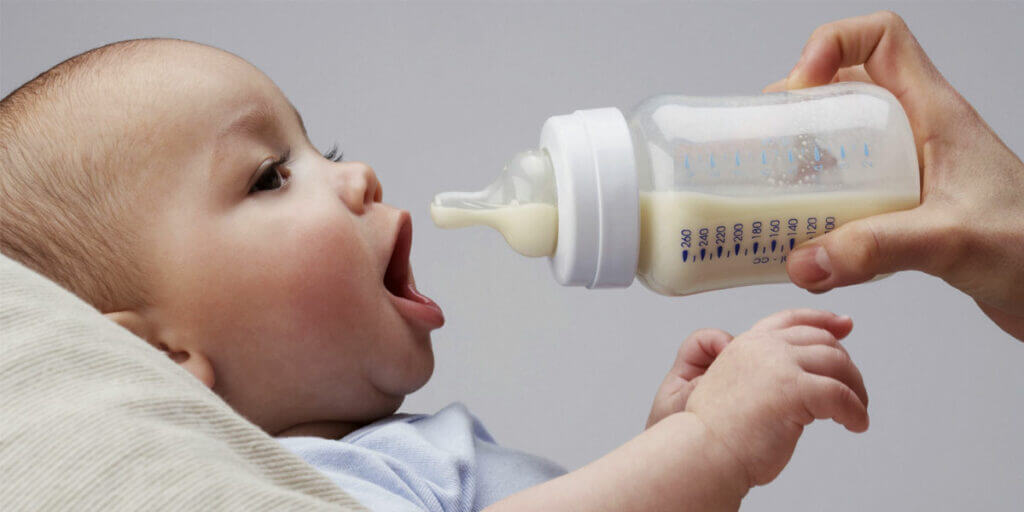Baby Vomiting Mucus: Causes & Prevention

Parenting can be tough. Really, really tough. Everything that happens to your baby seems to have a direct impact on you, mentally as well as emotionally. And looking at your baby vomiting can be extremely painful. But what if we told you that most of the times your baby is vomiting it is normal? Yes, you read it correctly. Your baby may be vomiting for extremely simple reasons which are necessary for your baby’s development. However, they still are reasons that may not be so common and might be causes of concern.
And there is a lot of confusion among new parents regarding the same. This is why we have come up with this guide on the causes and prevention of babies vomiting mucus. If you are also a little clueless about this, you do not have to worry. There is no need for you to freak out every time your baby spits up a little. Read on to know more about why your baby may be vomiting and how you can prevent it.
Common Causes of Baby Vomiting Mucus
1. Spitting up or Positing

It is common for babies to spit up usually because of their maturing digestive system. It can even be a lot at times. If spitting is the reason for your baby vomiting mucus, you might notice small burping before it and hence whenever you baby burps you can have a burp cloth ready for the cleanup. Now the amount of spit can vary from baby to baby and from time to time.
Sometimes you will see just a little drool while at other times it could be a lot of spit-ups. This kind of spitting up is extremely common in babies. You do not have to worry at all. In fact, it is healthy for a baby to drool a little milk after they have eaten since it also diminishes the probability of overfeeding. however, if you feel like your baby is vomiting out the entire milk that they have feeded on, it might be a case of concern.
2. Teething

Teething is a very difficult phase for both the babies and the parents. With reading, you will see a lot of drooling and frustration in the kid building up. Babies usually cut their first tooth between 5 to 7 months. It sure is something to be celebrated, but it is not entirely painless. It brings discomfort and sometimes even pain for the baby due to which they may not look fine. To cope up with this discomfort, sometimes the baby may roll a lot of clear saliva. They may even spit up excess drool.
There isn’t a lot that you can do to help with this discomfort. However, you may give your baby a little comfort by rubbing their sore gums with your fingers or by giving them a cool teething ring that they can bite on. This drooling is a temporary phase and should not turn into vomiting. If this spit up turns into vomiting, it may not just be because of teething. You must consider other symptoms and consult with the pediatrician.
3. Quick Milk Flow

Sometimes it so happens that the amount of milk that a baby can take at one time is less than what they are getting from their mother or the bottle. This milk flow which is fast and in copious amounts makes the baby drink milk speedily. However, the baby’s stomach is still in the development phase and is usually not prepared to intake this high quantity of the feed. It is in these times that the baby starts to drool the excess feed. This is a natural reaction by the baby. What you can do in such times is to change the bottle years or turn the baby’s position in such a way that the milk intake is controlled.
4. Overfeeding

Your baby’s digestive system takes quite some time to mature and develop. And in this development, a key role is played by the valve in the stomach. Until this valve is fully grown and developed, some drooling may occur. This is because, while feeding the baby, the valve can be put under excess pressure which may fail it, leading to vomiting. This happens mostly when the baby is overfed and not regularly. This is also because when the baby is overfed, the stomach does not stretch on its own. It starts to overflow.
You don’t have to worry about this since this is normal and will stop in some time. There isn’t a lot that you can do because sometimes the babies tend to keep drinking even after they are full. And hence you do not have to feel bad about your parenting because they will eventually end up throwing and you will not have played any role in it.
Recommended: Best Baby Food Steamers in UK
5. Infection or Illness
If you have noticed your baby vomiting milk, the very first thing that comes to your mind is an infection or an illness that your baby might have got. This also makes sense because the baby’s immune system is still developing, which makes them an easy target for various kinds of bacterias and viruses. If you think that this is why your baby may be vomiting the feed, you must consult a doctor since a weak immunity for a baby may be dangerous in many ways. Such infections and illnesses can affect the baby’s respiratory system, which causes them to cough a lot.
This cutting can even lead to vomiting mucus. Another illness-related reason for your baby vomiting mucus can be due to certain bacterias that affect the digestive tract or the baby’s intestines. These bacterias lead to indigestion and diarrhoea, which is accompanied by vomiting. In either case, a doctor must be consulted as soon as possible.
6. Reflux

This is another common reason for why a baby might be vomiting mucus. In medical terms, it is known as gastro-oesophageal reflux (GER). This takes place when the baby regurgitates the food from the stomach, and it spits up. This is very common in babies and can happen as often as a few times a day. If you feel that your baby is happy and is gaining weight, this reflux should not be a concern.
This kind of vomiting due to Reflux will be at its peak when your baby is around 4 months old and can go on till they are a year old. It does not leave any other issues to the baby and is thus absolutely fine. It is rare to find that this reflux can mean something serious like a blockage in the digestive system or allergy. In these cases, you might want to consult a doctor and have some medications prescribed.
Also read: Grunting Baby Syndrome – Why is your Baby Grunting?
7. Pyloric stenosis
Before you stress yourself looking at the heading itself, we ask you to calm down and relax since this is a very rare condition in children. But we cannot rule out the possibility, and hence you need to know about it. If your baby is suffering from pyloric stenosis, you may notice a very specific kind of vomiting pattern in your baby. Your baby will be vomiting forcefully, which will end up emerging out in a projectile form.
As we mentioned earlier, it is very rare and usually manifests itself a few weeks after the childbirth. In this condition, the muscle which connects the intestine to the stomach seems to swell up and thickens. This prevents any food from passing further into the intestine, which results in backflow of the milk in the form of vomit. In this case, you will have to consult a pediatrician.
How to Prevent your Baby from Vomiting Mucus
No matter what the reason is, you might want to prevent your baby from vomiting the mucus. Here are a few things that you can try for the same.
1. Burping

It might seem like burping isn’t something new since you must always be making your baby burp after the field. But if your baby vomits mucus, you might want to employ a new burping method for the baby. You should encourage your baby to burp after having drunk one fourth or even one-eighth of the feed that the baby takes. This will reduce the risk of your baby throwing up after having fed entirely. Additionally, for the first six months after your baby’s birth, you must keep the baby upright for 12 to 15 minutes after feeding so that the milk can be prevented from being brought back up. You may notice a little spitting while the baby is burping, but that is normal and will prevent larger vomits.
2. Reducing the flow of milk
Excessive flow of milk can make the baby choke and vomit. Therefore the flow of the milk must be reduced to prevent vomiting. If you bottle-feed, your baby makes sure that the nipple of the bottle is small enough that controls the flow and allows the baby to drink at their own pace. The ideal dripping rate is one drop of formula per second when the bottle is held upside down. But if your baby is breastfed, you should squeeze some milk out of the breasts beforehand to avoid larger flow. Another thing to keep in mind is that even small amounts of milk flow can provoke vomiting; therefore, you must ensure that the flow of the milk isn’t reduced to extremely low a good rate of milk flow should be ensured. You can even opt for an anti colic bottle.
3. Switch to a Different Type of Milk

If you notice your baby vomiting after feeding formula, maybe it is time to switch to different feed formula. If you feed your baby cow’s milk and they seem to be vomiting it, it could also mean that they are lactose intolerant. In this case, you can switch to soya milk and check if there is any change. In very rare cases the babies can be allergic to natural milk of any sort. For this, you may have to switch to bottle-feeding using a special formula of milk. So, an easy way is to switch to different milk and try them. You can continue with the best-suited to your baby, which does not make them vomit.
4. Minimize motion sickness
If you have noticed that your baby vomits feed only when you have been travelling, the possible solution to this is to minimise the motion sickness as much as possible. You can try to schedule as many breaks as possible. This will relax the baby and will reduce the vomiting as well. Motion sickness can be discomfortable to the babies as much as it is for the adults. And the way to tackle it is similar in both the cases. Keep them hydrated while also making sure that they do not eat or drink too much.
5. Change Your Diet
If you breastfeed your baby, this is something that you might want to try. Sometimes what the mother eats affects the kind of milk she produces. There are also possibilities of any allergic substances in your diet that can affect your baby’s diet. If you have made any changes in your diet recently, you might want to alter them and see if any difference is seen. You can try to keep adjusting your diet until you have figured out what was going wrong in your diet and then plan accordingly.
Conclusion
There can be many reasons for your baby getting sick and vomiting most of them are harmless, natural and even common, but some of them may be things of concern. You can hardly do anything about them except for a few changes that you might try to bring. Therefore if you think that something is wrong which might be causing your baby to vomit, you should go for medical assistance as soon as possible. Getting your baby checked is the best way to get to know whether or not you need to be concerned about your baby vomiting. Even if nothing comes out to be wrong, you will at least be assured and relaxed.
In the end, we would like to suggest you must keep calm and do not panic since it is not going to help anyway. We also hope that this small guide on why your baby might be vomiting and how you can prevent it has helped you a little. Happy Parenting!

Laura is a trained primary teacher who takes a profound liking in interacting with and bringing out the best in children. She is also an ISSA certified pediatrician with an extensive practice of over 12 years. Laura comprehends the needs of infants and now compresses her expertise into writing thorough parenting guides to aid new parents.





